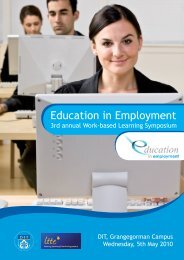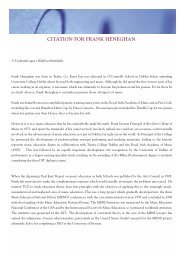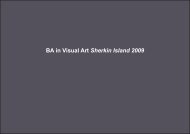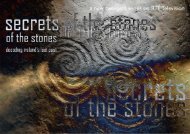TWICE THE SIZE - DIT Update - Dublin Institute of Technology
TWICE THE SIZE - DIT Update - Dublin Institute of Technology
TWICE THE SIZE - DIT Update - Dublin Institute of Technology
Create successful ePaper yourself
Turn your PDF publications into a flip-book with our unique Google optimized e-Paper software.
nationalistic government has set about pr<strong>of</strong>oundly shaping change in a more realistic manner.<br />
Policy initiatives, political processes and social values are all geared towards encouraging<br />
individuals, organisations and communities to integrate environmental concerns into everything<br />
they do. A key focus is on using simple and transferable technology, together with inherent<br />
native ingenuity, to optimise the use <strong>of</strong> local and regional resources, without compromising<br />
long-term conditions and reserves. The capacity <strong>of</strong> different localities and regions to achieve<br />
this balance varies greatly, and leads to diverse, and sometimes perverse, outcomes. Global<br />
and European environmental problems receive considerably less attention.<br />
Energy systems similarly have been shifted away from a centralised scheme <strong>of</strong> generation and<br />
distribution, and restructured around an array <strong>of</strong> local fossil and non-fossil fuels. Increasingly, a<br />
wide range <strong>of</strong> small-scale renewable energy technologies are exploited, particularly wind, wave,<br />
biomass and photovoltaics. Combined heat and power systems flourish. Much <strong>of</strong> this<br />
transformation is paid-for through funds raised by substantial energy taxes, and the<br />
consequently high energy process encourage further adoption <strong>of</strong> energy efficient measures and<br />
an overall fall in energy demand.<br />
Learning<br />
The past ten years have witnessed a startling metamorphosis in Irish education. Up until 2020<br />
the overriding emphasis had been upon advanced science, high-technology and international<br />
business. Globalisation, and the unbecoming scramble for external funds, had seen a massive<br />
influx <strong>of</strong> foreign students, with very mixed results. Gradually to begin with, but more rapidly<br />
since about 2025, the accent has increasingly been placed on alternative technologies, local<br />
enterprise and heritage craft skills. The Irish language is also in the ascendancy, as are<br />
traditional cultural activities in the field <strong>of</strong> music, dance and literature.<br />
There is open and fair access to education in Ireland, but poor economic growth and low levels<br />
<strong>of</strong> public funding have precluded much investment in research. For years there has been a<br />
brain-drain <strong>of</strong> the brightest and the best, but signs are just appearing <strong>of</strong> an inflow <strong>of</strong> scholars in<br />
the arts, humanities and environmental sciences who are seeking a change <strong>of</strong> lifestyle and a<br />
fresh challenge.<br />
Valediction<br />
Ireland is on the cusp between a failing, open, modern, industrialised and connected economy,<br />
and a renewed, patriotic, localised and introspective nation-state seeking a modest yet<br />
comfortable future.<br />
127








